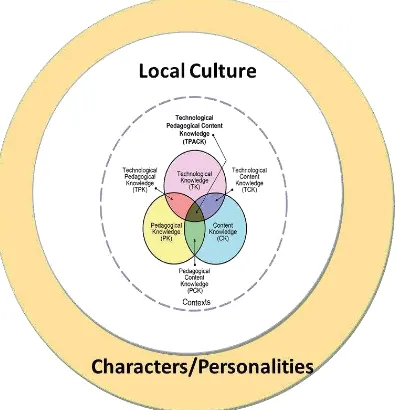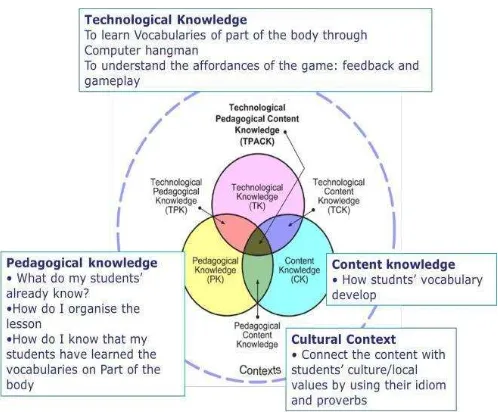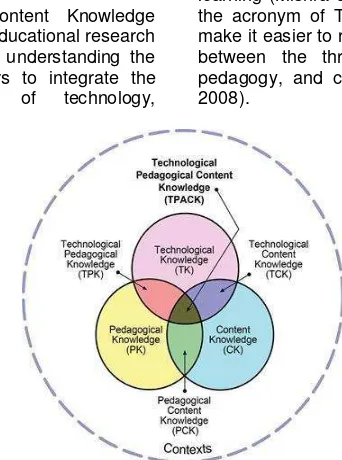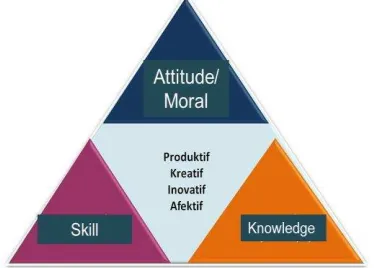LOCAL CULTURE AND MORALITY ATTACHMENT TO TPACK FRAMEWORK
OF PRE-SERVICE ENGLISH TEACHERS WITHIN THE CHALLENGE OF THE
21
stCENTURY SKILLS
Akmal
Universitas PGRI Semarang, Indonesia [email protected]
First draft received: 11 November 2016 Final proof received: 20 February 2017
Abstract
In 2045, Indonesia is determined to have a golden generation in order to improve the nation's competitiveness. However, in reality the condition of teenagers today is very alarming. The data show about 93 out of 100 elementary school students have already consumed pornography; about 21 out of 100 young women have abortions; some 135 teenagers become victims of violence every day; 5 out of 100 adolescents contract sexually transmitted diseases; 63 out of 100 teens have sex before marriage. School teachers should take active roles in minimizing such unhappy figure and prepare the golden generation. This article proposes local culture and local moral to complete the Technological Pedagogical Content Knowledge (TPCK+) within the challenge of the 21st century skills. The objectives are to provide pre-service English Teachers at Universitas PGRI Semarang and pre-service English teachers in general with the ability to develop English course content in the students‟ cultural context as well as local characters and to equip the pre-service teachers with the 21st
century skills. The subjects were 345 pre-service English Teachers who took the TEFL, Teaching Media, and ESP Courses during the academic year of 2015/2016 and 2016/2017. The data were collected through observation, teaching practice, and self-evaluation. The results show 84.92% of the students were included under the category of “good” and “very good” in pedagogical skills, 77.38 % in pedagogical content knowledge, and 87.53 % in cultural and local wisdom context in content development, but only 51.58% in technological knowledge. For improving technological knowledge of the pre-service students, there should be more training on the use of technology before and during the process of teaching and learning of pre-service English teachers.
Keywords: ethnopedagogy; technological pedagogical content knowledge; pre-service English teachers; 21st
century skill
To cite this paper (in APA style):
Akmal. (2017). Local culture and morality attachment to TPACK framework of pre-service English teachers within the challenge of the 21st
century skills. International Journal of Education, 9(2), 113-119. doi:
dx.doi.org/10.17509/ije.v9i2.5465
INTRODUCTION
Teachers tend to adopt and simply apply teaching model they learnt from experts of other countries
and neglect their students‟ socio-cultural contexts.
On the other hand, the students‟ knowledge and how they learn are developed through experiences within their distinct socio-cultural contexts. Since there will be different professions and qualifications needed by the future generation, the pre-service teachers today, should be prepared with the 21st Century skills. It is the challenge for pre-service teachers to have a global vision yet at the same time remain culturally and morally aware. Mishra and Koehler‟s research (2006) “Technological Pedagogical Content Knowledge: A Framework for Teacher Knowledge” until now has been made the benchmark by many researchers and teaching practitioners in an effort to develop several models of learning. The term was then known as TPCK/TPACK (Technological, Pedagogical, Content Knowledge). It is a framework in designing a new learning model by combining the three major aspects of the technology, pedagogy, and
content/material knowledge.
The advances in information technology are so fast and bring some changes in the teaching approach and methodology. The realia, talk-chalk-board tool, computer software, multimedia, internet, and virtual reality are among communication technologies that have brought significant influence on the lesson delivery. It is a necessity that teachers master the technology to be used as supporting media in learning activities. An example of the application of technology in learning is the use of website for online learning which can be mixed with class-room activities or known as blended learning. In this model, the process of teaching and learning eventually become quite effective as the students have an ample opportunity to enjoy various learning resources, have tandem learning, access synchronous and asynchronous lessons, etc. With educational technology, learning becomes fun and
Figure 1.Evolution of Educational Technologies
Throughout educational technology history, it has been found that computer has resulted in significant gain in teaching reading and writing (Liou et al., 1997), vocabulary building (Liu and Reed, 1995), ESP course (Leppen & Klaja, (1995), etc. In addition to the findings above, Mohan (1992) stated that within the environment of Computer-Assisted Language Learning (CALL), for example, the learners are able to communicate orally with other students as the software provides them with visual, audio and other situational clues. CALL also has significantly improved reading and writing skills (Nagata, 1998), writing and culture (Lee, 1997),
students‟ motivation (McNeil, 2000), reading and writing of adult learners (Liou et al., 1997), writing process (Thorson, 2000), error feedback (Ogata, Feng, Hada & Yano, 2000), and vocabulary building (Grace, 2000).
The idea of Mishra and Koehler (2006) on TPCK/TPACK is still incomplete because the teachers need to possess their students‟ cultural context and have good personality as they are role models for the students. The impact of information technology also has given negative results to the students. Beyond the social factors of the students, the teachers and school culture are believed to be
most responsible for the moral decline among learners. Thus, cultural contexts and moral values should be embedded into the TPCK/TPCAK.
In Indonesia, recent research shows that there are about 93 out of 100 Elementary School Students who have already practiced pornography; about 21 out of 100 young ladies have abortions; some 135 teenagers become victims of violence every day; 5 out of 100 adolescents are infected by sexually transmitted diseases; and 63 out of 100 teenagers have sex before marriage (Http://www.semai2045.org). Furthermore, Indonesia is estimated to lose about US$ 4.5 trillion by 2030 as a result of smoking-related and non-communicable diseases such as heart attack, cancer, and stroke (merdeka.com).
Thus, the additional aspects of local culture and moral values in the framework of TPACK (technological, pedagogical, content knowledge) should eventually change TPACK into TPACK+ (plus means culture and moral values). The mastery of technology, pedagogy skills, competence in scientific disciplines, which are adjusted to the local culture and wrapped with good personality, then a teacher becomes the role model and able to create 21st century human resources. Figure 2 describes my proposed framework of TPACK +.
ETHNO-PEDAGOGY
Education cannot be separated from the social and cultural aspects, as knowledge is generated, stored, applied, maintained and passed on from generation to generation. The local culture, wisdom, and its indigenousity should be passed to the following generation through educational institution or social practices.
By definition, ethno pedagogy is derived from the word Ethnic and Pedagogy, which means the process of teaching and learning in the context of ethnic or particular nation in order to maintain its national identity. The theoretical origin of ethnic pedagogy refers back to classical pedagogy which was represented by J.A. Comenius in 1673 (Lordkipanidze, 1954). The objective of ethno-pedagogy is to reconstruct social and cultural identity through pedagogy.
The idea of the Ethno-pedagogy in Indonesia was firstly coined by Alwasilah, Suryadi, & Karyono (2009) and Kartadinata (2010). Alwasilah, et al. (2009) argued in the context of the culture in general that ethno-pedagogy pays special attention to the local genius and local wisdom to uncover the values and culture as the initial model. The tales,
advice, poems, and children„s songs, myths, symbolisms, belief, and local culture are some of local contents that can be incorporated into the curriculum, teaching or learning process “Education is deliberative in the sense that society transmits and perpetuates the idea that good life comes from the fundamental belief about the nature of society world, knowledge and values” (Alwasilah et al., 2009, p. 16).
Ethno-pedagogy utilizes student‟s cultures to help them learn the subjects and skills taught in school (Gollnick and Chinn, 2013). The use of local indigenous in the classroom can give a chance to the teacher for designing and developing authentic and relevant teaching materials. Moreover, Ladson-Billings (1992) mentioned that by using texts that have characters of all different backgrounds, students can easily learn about new cultures.
From reading texts which may be available in print or on web sites, teachers can develop the content of the lesson into meaningful and authentic situations. Such condition can be seen in the following picture where high school students from Australia were learning an Indonesia traditional game called “engrang”
at SMP 5 Yogyakarta. From the game, the Australian students learn how to work in a team.
Fig 3. Engrang Traditional Game
Since teaching takes place in a complex and dynamic environment, teachers should be able to integrate very different knowledge domains. Ethnic identity should be embedded into the process of teaching and learning. In addition, teachers need to
know an appropriate incorporation of technology into their teaching. They should have background pedagogical, content, technological, and cultural knowledge.
Technological Pedagogic Content Knowledge (TPCK)
Technological Pedagogical Content Knowledge (TPCK) is known in the field of educational research as a theoretical framework for understanding the knowledge needed by teachers to integrate the three domains: knowledge of technology,
pedagogy, and content into the process of teaching and learning (Mishra & Koehler, 2006). In its development, the acronym of TPCK was converted into TPACK to make it easier to remember and to establish integration between the three types of learning: technology, pedagogy, and content (Thompson & Mishra, 2007-2008).
Figure 5. TPACK framework (Mishra & Koehler, 2006, p. 1026)
TPACK is a framework that describes the relationship between the three components and the complexity of the knowledge base (technology, pedagogy and content) (Koehler & Mishra, 2008; Mishra & Koehler, 2006). At the intersection area in the middle of the three circles, seven components are applied. They are as follows:
1. Technology Knowledge (TK):
TK is knowledge of various technologies, ranging from low technology such as a pencil, paper, talk, chalk, board, and paper to digital technologies such as the computer, CALL, internet, video, smart board, WiFi, Virtual Reality, WA, and Educational software program.
2. Content Knowledge (CK):
CK is the knowledge of the material which shall be taught at the Educational Institute to the pre-service teachers (Mishra & Koehler, 2006). A teacher should know about the content knowledge of the subject or the courses they will teach.
3. Pedagogical Knowledge (PK):
PK relates to teaching methodologies and approaches, including knowledge in teaching and classroom management, assessment, evaluation, development of lesson plans (RPP), and student learning.
4. Pedagogical Content Knowledge (PCK): PCK is related to the knowledge on the content and the way to deliver it to the students. It is related to the process of teaching (Shulman, 1986). PCK has different types of content because PCK is the combination of content and pedagogy with the aim to develop the practice of teaching a better content.
5. Technological Content Knowledge (TCK): TCK is the knowledge of how technology can create new representations for specific content. By using a specific technology, the teacher can change the way they practice and understand the concepts in specific content.
6. Technological Pedagogical Knowledge (TPK): TPK is the knowledge about how various technologies can be used in teaching and to understand that the use of technology may change the way teachers teach.
7. Technological Pedagogical Content Knowledge (TPACK):
TPACK is associated with the knowledge needed by teachers to integrate technology into teaching specific content. Teachers have an intuitive understanding of the complex interactions among the three basic components of knowledge (content,
pedagogy, technology) to teach content using pedagogical methods and appropriate technologies.
of scientific theories, facts, and methods (Koehler and Mishra, 2008; Koehler and Mishra, 2009). The
result of their works can be accessed from the following address;
1. http://www.geocities.ws/talisaliya/group17e/default.htm (ESP, English for the Hotel) 2. http://irpan-subhan.blogspot.co.id/-- (teaching narrative text)
3. http://www.geocities.ws/group47c/group47c/default.htm (Asking and giving apology) 4. https://www.youtube.com/watch?v=E-srGuhAuv4&feature=youtu.be (MBO Garuda Air)
Pedagogical Knowledge (PK): The knowledge of the pre-service English students about teaching process, teaching practices, or teaching methods. PK consists of understanding how learners learn, classroom management, lesson planning, teaching techniques and methods, knowing the qualifications of the target group, and using the strategies to
evaluate students‟ perceptions. Therefore, PK requires understanding of cognitive, social and developmental theories of learning and knowing how to administer them in the classroom (Koehler & Mishra, 2008; Koehler & Mishra, 2009).
Technological Content Knowledge (TCK): It requires not only the knowledge of subject matter to be taught but also how to teach the subject matter via technology. This skill can be identified from the work of group 7, which can be accessed through
this website: http:
//group7englishforhotel7c.blogspot.co.id.
In terms of Technological Pedagogical
Knowledge (TPK), the pre-service students at University of PGRI know the advantages and disadvantages of technological means. As a result, online based lesson was accompanied by the forum of group discussion. The forum represents the integration of pedagogical strategies with technology in delivering the lesson content. The forum is called ESP-PGRI with the address: http://esp-pgri.freeforums.net.
Then, the Pedagogical Content Knowledge (PCK) requires the pre-service students to have the ability to design and practice the subject matter to be taught. In the work of one of the pre-service teachers, she designed the lesson for teaching writing procedural text by using local product called Brebes Eggs and Brebes Fried Onion. In the video, she explains the definition of procedural text, its generic structure, language component, etc. She enriches the video with pictures and links to the website for further exercise and assessments.
Table 6. Results of the TPCAK training embedded in the core subjects
Categories Pedagogic Content Culture Technology
f % f % f % f % development, and only 51.58% in technological knowledge.
In contrast to the TPACK framework of Mishra & Koehler (2006) above, my framework in figure 2 adds two more competencies (Cultural and Personality Competences). This framework emphasizes the importance of local culture and moral value in the connections, interactions, affordances, and constraints between and among content, pedagogy, and technology. In this model, knowledge about content (C), pedagogy (P), and technology (T) is not enough to be a good teacher. However, rather than treating these as differently separated bodies of knowledge, the model proposed in this research additionally emphasizes the complex interplay of TPACK+. At University of PGRI Semarang, moral values were implanted to the pre-service teachers in the forms of academic subjects: PGRI Values, Basic Education, Pancasila, Professional ethics, etc. which are waived into the curriculum. Among the moral values implanted into the pre-service teachers are excellence, respect, toughness, religiosity, integrity, and synergy, or
known as UPGRIS core values.
The 21st Century Skills are translated simply as the skills necessary to face all challenges that exist in the global society of the 21st century (Trijling & Fadel, 2009).
The pre-service teachers who have technology literacy can help their students achieve their learning goals and benefit from computer, website, educational software, and culturally relevant teaching materials. Other skills needed by the 21st century teacher are learning and innovation skills, life and career skills, and information Media and Technology skills.
Figure 4. 21st Century Skills, Education, Competitiveness (Partnership for the 21st Century, 2008)
Figure 5. Integrated Skills of the 21st Century Teachers
Problems and limitation
After implementing the TPACK + framework at University of PGRI Semarang for 2 semesters out of the 4 semesters scheduled, some problem and limitations are encountered. They are elaborated in this section.
The rapid rate of technology change
Pre-service teachers cannot upgrade their Technological skill because of financial reasons. It is believed that the use specific software package not only makes their knowledge too specific to be applied broadly, but it also becomes quickly outdated. Technology is changing so fast that any method that attempts to keep teachers up to date on the latest software, hardware, is stuck to the financial reasons.
Inappropriate design of software
Most software tools available today are designed for the world of business and work, and only few are created for educational purposes. As Zhao (2003) argued, most software tools are rarely created as solutions to pedagogical problems. More often than not, they are created as potential solutions to problems in the world of business as anticipated by programmers and other developers. Converting these general tools for classroom teaching is neither trivial nor obvious. It requires the teacher to engage with the affordances and constraints of particular technologies in order to creatively repurpose these technologies to meet specific pedagogical goals of specific content areas. An emphasis on merely learning the technology may lead to an emphasis on students‟ learning technology (technology as the subject and content
of learning), rather than the subject matter that they are supposed to learn.
The situated nature of learning
Context-neutral approaches to technology integration encourage generic solutions to the problem of teaching. However, technology use in the classroom is context bound-and is, or at least needs to be, dependent on subject matter, grade level, student background, and the kinds of computers and software programs available. Despite valuable generic uses of technology (such as grade books), such approaches do not avail the full potential of technology for teaching specific subject matter. Finally, such generic solutions do not value the individual teacher—their experience, teaching style, and philosophy—by assuming that all teachers teach the same way and hence would use technology the same way.
CONCLUSIONS
Ethno-pedagogy plays important roles in the context of Technology-based teaching as cultural activity and the culture of teaching. The teachers should not copy past current trend in the education. The goal of teacher education is not to indoctrinate or train teachers to behave in prescribed ways, but to educate teachers to have sound skills for the 21st century students. The teachers should combine their pedagogic skill, technology skill, and content skill with cultural and personality skill.
other without the domain of culture and moral value or personality skill.
ACKNOWLEDGMENT
The author would like to express their appreciation for the supportgiven by the president of University of PGRI Semarang.
REFERENCES
Alwasilah, A. C., Suryadi, K., & Karyono, T. (2009).
Etnopedagogi: Landasanpraktek pendidikan
dan pendidikan guru. Bandung: Kiblat Buku
Utama.
Grace, C. A. (2000). Gender differences: Vocabulary retention and access to
translations for beginning language learners in CALL. Modern Language Journal, 84(2), 214-224. https://doi.org/10.1111/0026-7902.00063 Gollnick, D. & Chinn, P. (2013). Multicultural
education in a pluralistic society. Boston:
Pearson
Kartadinata, S. (2010). Etnopedagogik: Sebuah resureksi ilmu pendidikan (pedagogik). A paper presented in the 2nd International Seminar 2010 on Practice Pedagogic in Global Education Perspective. PGSD UPI, Bandung, 17 May, 2010.
Koehler, M. J., Mishra, P., & Yahya, K. (2004). Content, pedagogy, and technology: Testing a model of technology integration. Paper presented at the annual meeting of the American Educational Research Association, San Diego, C. A.
Koehler, M. J., & Mishra, P. (2009). What is
technological pedagogical content knowledge?
Contemporary Issues in Technology and
Teacher Education, 9(1), 60-70.
Ladson-Billings, G. (1992). Liberatory
consequences of literacy: A case of culturally relevant instruction for African-American Students. Journal of Negro Education, 61 (3), 378-91. https://doi.org/10.1111/j.1944-9720.1997.tb02363.x
Lee, L. (1997). Using Internet tools as an enhancement of C2 teaching and learning.
Foreign Language Annals, 30(3), 410-427.
Leppenen, S. & Paula, K. (1995). Experimenting with Computer Conferencing in English for Academic Purposes. ELT Journal, 49(1), 26-36. https://doi.org/10.1093/elt/49.1.26 Liou, Hsien.-Chin., Wang, S. H., & Hung-Yeh, Y.
(1997). Can grammatical CALL help EFL
Writing instruction? CALICO Journal, 10(1), 23-43. https://doi.org/10.2190/3161-M47F-GVAM-B38K
Liu, M.& Reed. W. M. (1995). The effect of hypermedia-assisted-instruction on second language learning.
Journal of Educational Computing Research, 12(2), 159-175
Lordkipanidze, D. O. (1954). Pedagogical teaching of K. D. Ushinsky.
McNeil, A. (2000).Computer-Assisted Instruction: Its value to second language learners. Eric Digest. No. ED 444365.
Mishra, P., & Koehler, M. J. (2006). Technological pedagogical content knowledge: A framework for teacher knowledge. Teachers College Record, 108(6), 1017-1054. https://doi.org/10.1111/j.1467-9620.2006.00684.x
Mohan, B. (1992). Models of the role of the computer in second language development, In M. Pennington and V. Stevens (eds.), Computer in
Applied Linguistics (pp. 110- 126). Clevedon,
UK: Multilingual Matters.
Nagata, N. (1998). Input vs. output practice in educational software for second language acquisition. Language Learning and Technology, 1(2), 23-40. Retrieved from
http://llt.msu.edu/vol1num2/article1/default.html Ogata, H., Feng, C., Hada, Y., & Yano, Y. (2000).
Online markup based language learning environment. Computers and Education, 34(1), 51-66.
https://doi.org/10.1016/S0360-1315(99)00039-1
Shulman, L.S. (1986). Those who understand: Knowledge growth in teaching. Educational
Researcher, 15(2), 4-14. DOI:
https://doi.org/10.3102/0013189X015002004. Thompson, A. D., & Mishra, P. (2007-2008). Breaking
news: TPCK becomes TPACK! Journal of
Computing in Teacher Education, 24(2), 38, 64.
Thorson, H. (2000). Using the computer to compare foreign and native language writing
processes: A statistical and case study approach. Modern Language Journal, 84 (2),155-170. https://doi.org/10.1111/0026-7902.00059 Trilling, B. D. & Fadel, C. (2009). 21st century & skills,
learning for life in our times. Hoboken, New
Jersey: John Wiley & Sons.
Zao, Y. & Frank, K. A. (2003). Factors affecting technology uses in schools: An ecological perspective. American Educational Research
Journal, 40(4), 807-840.



